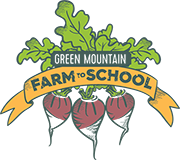
Farm to school programs at GMFTS focuses on experiential, hands-on learning that reaches across the cafeteria, classroom, and community. To learn more about why farm field trips are an important piece of this equation, we sat down with AmeriCorps Farm to School Coordinator, Madeline McGonagle, to hear about her experiences.
Why is it important to bring students to farms?
There are a couple of reasons it’s important for students to attend farm field trips. First, it’s an opportunity for students to get out of the classroom and have real-world learning experiences. It’s helpful – especially for young students – to connect what they are learning in the classroom to real-life situations. It also gives them really concrete experiences to draw on and helps them understand things – like life cycles, or soil science – in a very real way.
Second, I think that farm field trips strengthen relationships between consumers and producers. After a student visits a farm, it’s likely they’ll go home and talk about their experiences with their family. This starts a conversation in the home about the importance of local food and local farms. It also creates the possibility that the next time the parent – or teacher – is at the grocery store and sees a product from a farm their child just visited, they will purchase a local product after making that connection, which builds support for local food products.
Lastly, I think farm field trips strengthen relationships between school communities and farm communities – which is a critical component of farm to school programming. In small towns – like many of the towns we work in – schools are the center of the community so facilitating these interactions really ties both parties together. Teachers learn about local farms – sometimes about farms they didn’t even know existed – get to know the farmers, and create exciting learning opportunities they can draw on year after year.
Can you tell me about a recent field trip?
The last week of April, I took 16 kindergarteners and first-grade students from Lowell Graded School to Barn First Creamery in Westfield, Vermont. Barn First just joined Green Mountain Farm Direct as a producer, so we saw this as an exciting way to connect the dots between GMFTS programs.
The idea of visiting an animal farm came from the teacher, Keri Willey who was teaching the students about life cycles and wanted students to see first-hand the different stages of life.
So, I reached out to Merlin and Rebecca – the owner-operators of Barn First – to see if they would be interested in hosting a field trip. Merlin and Rebecca are strongly connected to GMFTS’s mission, and even though they hadn’t hosted a field trip before, they agreed. Together, Merlin, myself and the school worked out the logistics – the day, time, learning objectives and goals and scheduled the trip.
The trip took about an hour and a half. When we got there, Merlin first talked to the students about staying safe on the farm and then started the tour – taking students to see the cheesemaking room, the milking parlor, the barn, and then giving them a chance to interact with the kids (baby goats) inside then the older female goats and billies outside.
Merlin and Rebecca then sat down with the students and let them ask questions about Barn First’s operations and raising goats. It’s always exciting to see students ask thoughtful questions like ‘what do you feed the goats?’ and ‘why do you milk goats?’ and see them connect with producers around farming – which is so integral to this region’s culture.
Next, the students got the chance to try some of the cheeses, crafted by Rebecca, which really tied in everything they were learning about and helped the students connect the dots between the learning objectives.
It’s great to see students trying new food – I was impressed to see how many were willing to taste something they hadn’t tried before and also, so entertaining to hear their reactions!
As a coordinator, do you enjoy taking students on field trips?
I love taking students on field trips because the students get so excited, which can make it challenging to manage a group, but it’s rewarding to see them get engaged in learning, get outside, and connect concepts to real-life.
I’ve now taken students on four farm field trips this year – another really fun trip was taking 3rd & 4th graders from Irasburg to Bald Hill Fish Hatchery – and of course – trips to sugar houses are always a favorite. I have another field trip coming up this month and I am really looking forward to it.






